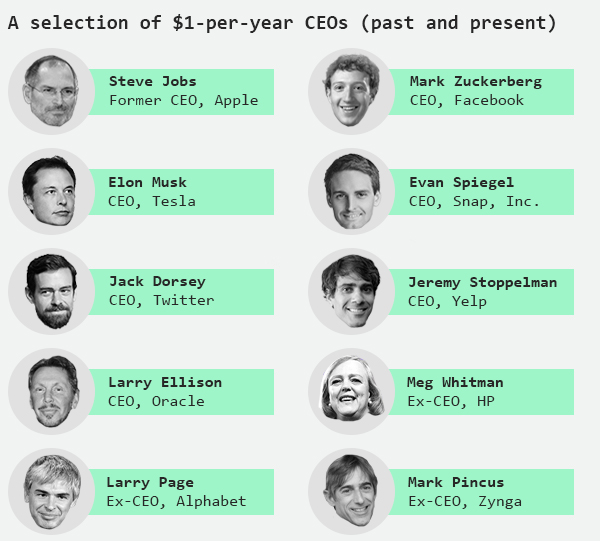The tech industry is one of if not the fastest growing in the world. And if you doubt it, the growing reliance on tech across every other industry across the globe should convince you straight away. And with that growth obviously comes a tonne of money for the companies that dominate the industry and their bosses. However, it was surprising to discover a curious trend that has actually lasted for the last few decades. A small but growing number of prominent tech CEOs have been reducing their cash salary to $1. That’s about KES 109 just so that you know how little that is. And as you are now, it did get us wondering why that is so and what the loophole really is with this move.
This trend is famously practised by some of Silicon Valley’s biggest figures. This includes Facebook’s Mark Zuckerberg, Twitter’s Jack Dorsey, Tesla’s Elon Musk and Snapchat’s Evan Spiegel just to mention a few. This is definitely something that would seem odd in a world where the minimum wage is going up just for these moguls to take the opposite direction.


Image courtesy Zachary Crockett / The Hustle
According to Forbes, there are a number of reasons why many bosses do this while still having networths enough to buy a whole continent.
Company’s Stock
Research suggests that many CEOs who take a $1 salary are usually rewarded with stock, option or bonus packages that match. Sometimes, they even tend to outweigh what they would have received as cash.
In a study done back in 2011, 50 executives were found to be sacrificing about $610k in salary for just that one $1. But in return, they were found to be gaining up to $2 million in other “not-so-visible forms of equity-based compensation.” So it becomes quite clear that stock value is much more attractive to these individuals than any other form of asset.
Steve Jobs was one who famously slashed his salary to just $1 every year from 1997 to 2011, getting $15 in total cash pay. During that period, his stock value increased from $17.5 million to $ 2.2 billion and Apple rewarded him with a $90 million private jet.
This has been similar to the current bosses who choose to get rewards and bonuses rather than take the money.
Taxes
It has been quite speculated that most of these figures just do this to evade the huge taxes that the U.S. government demands from them. But as it stands, this might be partly true as they are actually forced to get these low salaries.
Long before the huge executive pay packages of the last few decades, the IRS (Internal Revenue Service) labelled some pay unreasonable and levied extra taxes as a result. This then forced the companies to go the current route and reduce the salaries to a point where IRS now complains that the pay is too low. But that does not mean that these executives get to space taxes completely.
The packages they currently receive are categorised as “dividends” instead of pay. Luckily, the tax rates on these dividends are much more favourable compared to those on cash salaries. Moreover, this form of compensation means that the firm also gets to avoid sharing the tax load with the employee.






Comments